Böhse Onkelz
Founded in November 1980. Inspired by punk some teenagers felt it only logical to start their own band. The name came to them in the winter of 80/81 when several children called the green-haired youths in rural Hösbach böse Onkels (evil uncles). The name stuck, and even later was not to be changed. Their family backgrounds range from middle-class to asocial. As the Böhse Onkelz approach their coming of age, they start breaking out of the confines of Hösbach and head to Frankfurt on weekends to meet other Punks. 1981 Türken raus (Turks out): Contrary to many claims that the Böhse Onkelz wrote their scandal song Türken raus, for which they are still reproached, as a skinhead band, this song was actually one of the first songs in their repertoire and was written in the context of the clashes between the youth from different cultures who lived in the Frankfurt suburbs. On the other hand, it cannot be disputed that for the next five years the Böhse Onkelz take on an attitude that is hostile to foreigners, a fact that will not be glossed over here. During the first two years the Böhse Onkelz play some gigs in Youth Center Bockenheim. Their repertoire includes, along with Türken raus (Turks Out), a few other typical punk songs, Bullenschwein (Cop Pigs) and so on. With less aggressive songs and German texts, its popularity and softness take fans away from punk.
The Böhse Onkelz, in all their asocial notoriety and authenticity, keep one eye on the shards left by the fragmented punk movement and the other eye on England where a new trend is emerging. As always, a new movement takes time to reach Germany. And this time the magic word is Oi! Within a relatively short period of time, oi! becomes a battle cry for a whole generation of young working-class kids, barely out of puberty, who spend their weekends getting into fights with opposing fans in the stadium. At first oi means being apolitical, singing fast punk with hard texts, dressing a bit neater than the gutter punks, and not giving in to anything or anyone. While bands such as Slime from Hamburg take the radical leftist path, the Onkelz first spring onto the apolitical oi! train, which gives them room and opportunity to vent their anger. The cohesiveness of the youth movements in the punk and the young skinhead scene cannot withstand the political pressure and very quickly falls victim to a radical schism. What transpired quickly in Great Britain now also unfolds in Germany. The radical right starts abusing the pride as well as the latent patriotism of the oi scene for their own purposes. During their gig in Berlin in 1983 (in the bunker of a nazi-band called K.D.F.) they played the song "Türken raus" for the last time and, for the first and last time the song Oi, Oi, Oi, now renamed Deutschland den Deutschen (Germany for Germans), the version found on the demo tape. The still small skinhead scene celebrate the Onkelz as their heroes and the right-wing parties see a chance to directly infiltrate the scene. In 1983 the Böhse Onkelz begin sliding from the oi! movement to the skinhead scene. The Böhse Onkelz are still inexperienced in the music business and enthusiastically sign the deal.
1984 is a pivotal year for the Böhse Onkelz: they record their first LP Der Nette Mann and secure for themselves the title cult band of the skinhead and hooligan scene. Der Nette Mann is the first album from a German band whose members are 100% skinheads and who feel connected to the scene. The texts in Der Nette Mann deal almost exclusively with violence, alcohol and sex
Later (1986) the inspection of the album by the German Federal Supervisory Agency for Publications Harmful to Young People (BPJS) banned the album from the german market. After two more albums the Onkelz played the last gig as a Skinhead-band in 1985. From the beginning they make it very clear where they stand politically. Even before the Böhse Onkelz step on the stage, the skinheads chant in unison with the raised right arm of the Hitler salute Germany for Germans, Foreigners Out, and Sieg Heil. One can reproach the Onkelz now for not immediately canceling the gig. Even if the band was involved in building up this scene, and even if at the beginning it was not clear what direction their scene was marching in, they nonetheless have to put up with being called a xenophobic right-wing band in this phase. Even if the bands political orientation cannot be described as radical right-wing, and they themselves, even during this phase, did not see themselves as radical right-wing, their audience still spoke an unmistakable language. The Böhse Onkelz no longer want to be a cult band in the skinhead scene.
The year 1987 marks the second year following the Böhse Onkelz exit from the skinhead scene and their first metal album Onkelz wie wir on a new label. For the most part the press still shows no interest. Only a few music magazines know anything about the Onkelz exit from the skinhead movement but do not want to acknowledge the change. The song Erinnerungen (Memories) which is a song of the album O.w.w. was the end of their affiliation with the skinhead scene, and it signalized and documented their exit. It must be assumed, however, that the media knew nothing about this turn of events and that the dawning of consciousness in the Böhse Onkelz in this period was not a matter of interest. Otherwise there would be no explanation for the later errors in research and assertions on the part of the daily newspaper press. Meanwhile even Kevin has sworn off the skinhead scene. He throws off his suspenders and boots and lets his hair grow. At the same time, however, his use of drugs increases. True, before he had smoked pot, boozed and sniffed glue, but now he switches to cocaine, LSD, speed and ecstasy. His flat in Weberstrasse 28, nicknamed the 28, becomes more and more of a drug hole. At the beginning the rest of the band hangs out there, too. Against this backdrop is the release of the bands fifth studio album Kneipenterroristen (pub terrorists) in the autumn of 88.
The year 1990 becomes one of the darkest years for the Böhse Onkelz. Kevins drug escapades in 28 inspire Stephan to write some of his gloomiest texts. Songs like Leiden (Suffering), Necrophil and Hast du Sehnsucht nach der Nadel (Are you addicted to the needle) impressively express this mood. The 90 release of Es ist soweit (Its gone far enough), the Onkelz sixth studio album, which has outstanding sales, is one of the best german hard-rock/metal-albums in history! The low point in the year 1990 hits when the best friend of the band, the 23-year-old electrician journeyman, Andreas Trimborn, is stabbed to death in Speak Easy, a pub in Alt-Sachsenhausen. Another key experience that inseparably welds the band together and delivers much material for new songs. But at the same time Kevin completely sinks into his mire of drugs. He is now consuming huge daily doses of cocaine and , and is visibly going downhill. The small amount of media presence in daily newspapers and music magazines makes it very clear that the Böhse Onkelz are not accepted by the music industry and their exit from the skinhead scene is not acknowledged. The few articles dealing with the Onkelz accuse the band of still being active in the right-wing scene, of expressing their views more cautiously and in a different manner for marketing purposes, but of still deep down being nothing more than a Nazi skinhead combo that plays bad music and at best should be silenced. Meanwhile the Es ist soweit LP has sold 30,000 copies in nearly record time.
Their 1991 release, their first LP on Bellaphon, titled Wir ham noch lange nicht genug (We havent nearly had enough), is strongly influenced by the processing of their personal experiences. Within a few months 100,000 copies of the album have been sold. As the press gradually starts taking notice of the Onkelz phenomenon and tries to trace their popularity solely to their cult status in the skinhead scene, the demands for a name change grow louder. At this time the band has not made a single video clip for a music program, nor has their music ever played on the radio. The music industry calls for a public boycott of the band and starts massively influencing the market. The aim is either to silence the band or to force them to regroup under another name, better yet with English texts. Offers confirming this proliferate. The band still refuses to discuss a name change and responds to the pressure with its songs. It should be possible in Germany, says the band, to change your views, admit your mistakes, to mature intellectually. Everyone is entitled to an evolution of consciousness. Stephan and the band firmly resolve to make the name Böhse Onkelz a symbol for changing your views and not bowing to pressure. Kevin seems lost , he is now an alcoholic and a heroin junkie and only with extreme difficulty can he carry out the few concerts they have. The band experiences its biggest crisis since their founding in the autumn of 1980. While Kevin is consuming two liters of Jägermeister and several grams of heroin a day and is doggedly working towards his own destruction.
In 1992 the press war against the Böhse Onkelz reaches a climax. News coverage takes on increasingly grotesque proportions. In spring, the Live in Vienna recording sells exceedingly well, as do a VHS sales video and a live double album, and when the release in the summer of 1992 of their eighth studio album Heilige Lieder (Sacred songs) shoots to number 6 on the German Media Control Charts without any advertisements, without any radio airplay and without any video clips, a storm of indignation breaks out. Within a short time the record sells 200,000 copies and the media term right-wing rock is presented for the first time to frightened readers. Many articles blame the Onkelz for the right-wing radical attacks in Mölln, Solingen, Hoyerswerda, Hünxe and elsewhere. They are described as the spearhead of the neo-Nazi scene, are mentioned together in one breath with right-wing fascist bands that do not sell more than 500 records. Some journalists are not beneath playing Onkelz texts backwards and reversing the letters in an effort to find hidden fascist messages. Since their previous album in 1991, the band has resolved not to give any more interviews. But events in Germany force the Böhse Onkelz to declare themselves more clearly, and so starting in autumn of this year, Stephan Weidner runs every week from one interview appointment to the next.
The band plays many more gigs, put out more records which are still down in german rock-history. Songs about life, pain, sorrow, anger, faith, peace, politics and lies. Since 1994/1995 Kevin is clean (until his relapse after the split). The following records were all in the media control charts, since 1998 every record is a no. 1!
The Onkelz shared the stage with bands like Rose Tattoo, Motörhead, Biohazard, Pro-Pain and many more. They distanced themselves from Nazis in songs and fights infront of the stage. The Böhse Onkelz are a voice of a generation, of a own religion. Real music from the streets of Frankfurt, Germany for the real underdogs for 25 years in rock history!
A shock to all Onkelz fans, the Onkelz announced the end of the band on May 24, 2004 on their homepage, despite the fact that the new year had started off with a bang. The press picked up the topic and reported on it with all its usual polemics. In reality, the reasons for the breakup of the reputedly most controversial German rock band in history is much more mundane and understandable than its fans imagine. Every Onkelz song has been sung, they say, and every beer has been drunk. Everything has been achieved. The Onkelz phenomenon has been exhausted and theres nothing more to be got from it. Every member of the band agrees that it has been the work of a lifetime and as such is far too valuable to let it slide into dull mediocracy. So before the Onkelz lose credibility among their own fans, they unanimously decided to proclaim the end of the Böhse Onkelz. The disappointment of their fans is bottomless and has been intensely discussed on fan pages in the Internet and expressed in countless letters and emails to the band. But for the Onkelz there is no more return. They believe that a band that has so often been called to account for its actions and has so often expressed its opposition to appropriation and commerce must not let the moment pass in which enough is enough. They also believe that ending the Böhse Onkelz at this unexpected point in time will prove their own credibility and represent the highlight of their career. The least commercial thing anyone could do at this point in time is to quit, they say. And in fact the split comes at a time in which record sales have reached a new high despite the poor economic situation in the music branch.
The Böhse Onkelz are a unique phenomenon in Germany. They are the most commercial underground band that has ever existed, the most controversial microcosm in the music business, independent and self-sufficient, a brilliantly functioning mainstream despite all market laws to the contrary, a mutation in the monotony of the music world, and its own pigeonhole in the administrative apparatus of the Phono Akademie. No band has ever managed to so polarize its fans and non-fans as the Böhse Onkelz have. No band in Germany has ever been so intensely loved and so vehemently hated. While the two largest German rock magazines, Rock Hard and Metal Hammer, have published cover stories and special reports on the Böhse Onkelz and have frequently traveled to Frankfurt for interviews, the less important magazines, holding firmly onto their prejudices, have been a constant source of small polemical hate reports. For instance, Josef Winkler of Musikexpress writes: But hot from the press! Weve just received a report that the Böhse Onkelz have disbanded. If you need a laxative, go to www.onkelz.de and never again to read this unbelievably bombastic statement prattle from the band members . Thats just how the band wants to be remembered, gehasst, verdammt, vergöttert (hated, damned, adored). And so the Onkelz are calling it quits because its time to call it quits. The last gig(s) ever played in the summer of 2005 at the Eurospeedway/Lausitzring. The festival was sold out, the last album Adioz number 1 again. A legend say ADIOZ!!! Rest in peace / Viva los tioz!
Discographie (offical albums):
DER NETTE MANN (Rock-O-Rama-Records, 1984) + BÖSE MENSCHEN - BÖSE LIEDER (Rock-O-Rama-Records, 1985) + MEXICO 'EP (Rock-O-Rama-Records, 1985) + ONKELZ WIE WIR (Metal Enterprises, 1987) + KNEIPENTERRORISTEN (Metal Enterprises, 1988) + LÜGENMARSCH 'EP (Metal Enterprises, 1988) + ES IST SOWEIT (Metal Enterprises, 1990) + WIR HAM' NOCH LANGE NICHT GENUG (Bellaphon Records, 1991) + LIVE IN VIENNA (Bellaphon Records, 1992) + HEILIGE LIEDER (Bellaphon Records, 1992) + WEIß (Bellaphon Records, 1993) + SCHWARZ (Bellaphon Records, 1993) + GEHASST, VERDAMMT, VERGÖTTERT (Bellaphon Records, 1994) + HIER SIND DIE ONKELZ (Virgin Records, 1995) + E.I.N.S. (Virgin Records, 1996) + LIVE IN DORTMUND (Virgin Records, 1997) + VIVA LOS TIOZ (Virgin Records, 1998) + EIN BÖSES MÄRCHEN... (Rule23/Virgin, 2000) + GESTERN WAR HEUTE NOCH MORGEN Best Of (Rule23/Virgin, 2001) + DOPAMIN (Rule23, 2002) + ADIOZ (Regel23/SPV, 2004) + LIVE IN HAMBURG (Regel23/SPV, 2005).
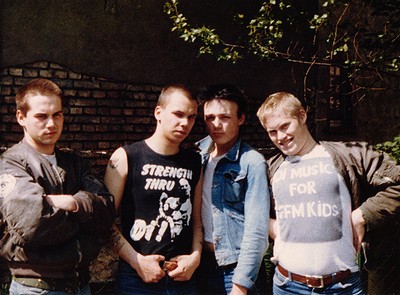
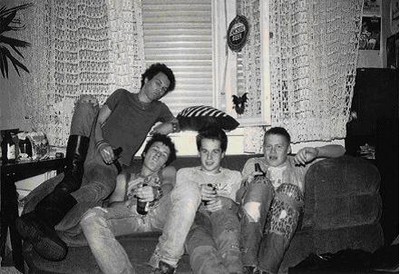
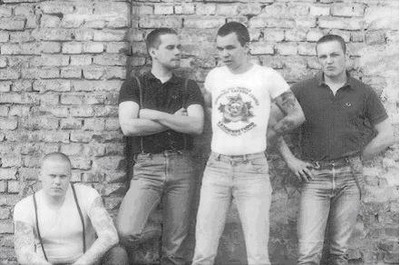
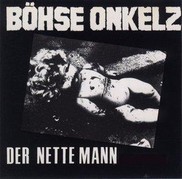
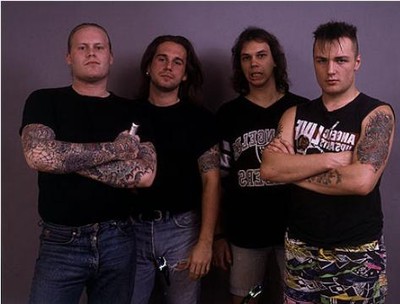
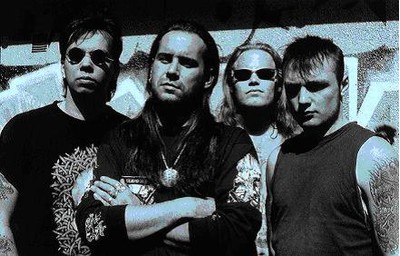
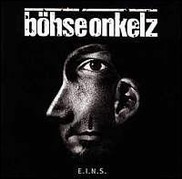
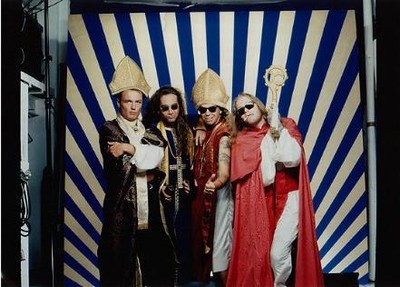
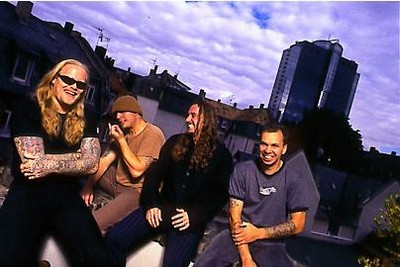
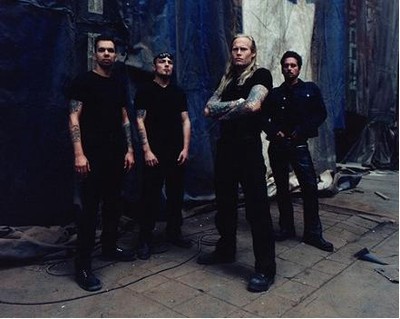

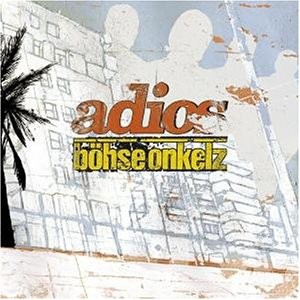
Interviews
Bands:- Ani Krok Spat! NEW!
- Antisocial
- Battalion 86
- Battle Scarred
- Bootprint NEW!
- Bootstroke
- Bulbulators
- Ciurma Skins
- Code 1
- Combat 84
- Crusaders
- Discharger
- Enhärjarna
- Fear City
- Grinny (Skrewdriver)
- Haggis
- Hovorkovi Chuligáni
- Iron Fist
- Kampfzone
- Les Vilains
- Mummy's Darlings NEW!
- Operace Artaban
- Paris Violence
- Patriot
- Pilsner Oiquell
- Retaliator
- Roials
- Short Cropped
- Smashpoints
- Superyob
- The Agitators
- The Black Tartan Clan
- The Casuals
- The Cliches
- The Incited NEW!
- The Junkers
- The London Diehards
- The Pera-S
- The Riot
- The Vendetta
- Unit Lost
Scene supporters:
History
- Another Man's Poison
- Bakers Dozen
- Banner of Thugs
- Battle Scarred
- B?hse Onkelz
- Bonecrusher
- Brazil (Skinhead report)
- Bruisers
- Chelsea
- Comando Suicida
- Dims Rebellion
- Discipline
- Immoral Discipline
- Indecent Exposure
- Kategorie C
- Lion's pride
- Major Accident
- Nabat
- Red Alert
- Ritam Nereda
- Slaughter and the Dogs NEW!
- Special Duties
- Stormwatch
- The Adicts
- The Jinx
- The Last Resort
- The Warriors
- Ultima Thule

